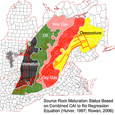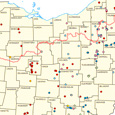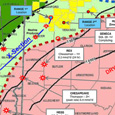Wildlife expert warns of ecological risks of natural gas drilling
Friday, January 30, 2009
UNIVERSITY PARK, Pa. — With the unprecedented wave of deep-well, natural-gas drilling occurring across much of Pennsylvania, care must be taken to minimize impacts on wildlife and forests so critical to the state’s economy and heritage, according to a wildlife expert in Penn State’s College of Agricultural Sciences.
The Keystone State must proactively plan natural-gas development associated with the Marcellus shale in a way that minimizes negative effects to valuable resources, said Margaret Brittingham, professor of wildlife resources.
She pointed out gas development particularly threatens the large blocks of mostly uninterrupted forest covering the northcentral part of the state.
Vitally important
Forests are vitally important, providing ecological services to all Pennsylvanians, Brittingham explains.
“Forests produce oxygen, sequester carbon, protect watersheds and improve water quality and the climate,” she said. “In addition, our forests have great economic value. Forest-related industries in the state contribute $17 billion to the state’s economy and employ more than 90,000 people.”
Online seminar
Brittingham will talk about the effects of natural-gas drilling on forest habitats during a free online seminar at 1 p.m. March 18.
The one-hour webinar is part of a series of monthly online workshops addressing various issues related to Marcellus shale gas exploration and extraction.
For information about these webinars go to http://live.psu.edu/story/36528.
Forests provide habitat for thousands of plants and animal species, and these in turn provide benefits for people from aesthetic and cultural to recreational and economic, Brittingham noted.
Ecotourism, aesthetics and recreation are very important in Pennsylvania, particularly in rural communities.
“Gas-well development changes the landscape — land is cleared for well pad sites, heavy equipment and drilling rigs are brought in, and infrastructure, such as pipelines and roads, is established to transport gas from the site,” she said.
Biggest concerns
Brittingham lists forest fragmentation, accelerated spread of invasive plant species and disturbance of sensitive habitats as the biggest concerns resulting from so much gas exploration.
She pointed out some wildlife species will be winners, and some losers, and certain vulnerable habitats should be declared off limits to well drilling.
“The winners are species that are habitat generalists, species that use a mix of habitat types, species that are tolerant of disturbance and can co-exist with people,” she said.
“Examples include raccoons and opossums and — depending on the extent of development and how sites are restored — may also include white-tailed deer. Bird winners include blue jays, grackles, crows and cowbirds.”
Wildlife losers include habitat specialists, area-sensitive or forest-interior species, species that are intolerant of disturbances and species with poor dispersal abilities, Brittingham explained.
Forest raptors such as the goshawk and broad-winged hawk will suffer, as will songbirds such as the scarlet tanager and wood thrush and forest amphibians such as salamanders and some frogs.
Not aware
“Most people are not aware 19 percent of the world population of scarlet tanagers and 9 percent of the world population of wood thrush breed in Pennsylvania forests,” she said.
These are known as “Pennsylvania responsibility” species because such a large proportion of the population breeds here.
“Many of the forest-breeding raptors are Pennsylvania species of conservation concern, and amphibian populations are declining worldwide. So we might see an increase in abundance of wildlife species that are common throughout the state and a decline in abundance of rare species and species dependent on Pennsylvania forests.”




